On October 9, 2025, I returned to New York City alongside eight other members of the US delegation for the Global Sumud Flotilla—an international, civil society–led maritime mission that had aimed to open a humanitarian corridor to deliver aid to the people of Gaza. Two days before, on October 7, we were released from Israel’s Ktzi’ot prison, an internment camp where we were unjustly detained without charges and treated to abusive prison conditions.
The flotilla set out for Gaza from a Barcelona port on August 31, and across 31 days, eventually over 40 boats, with over 500 people, sailed together across the Mediterranean Sea until the Israeli navy intercepted the convoy off the coast of Gaza on October 1. During the journey, the flotilla’s ships were attacked by drones on three occasions: across two consecutive days in Tunis, while docked at the Sidi Bou Said port, and then again, while sailing south of the island of Crete.
After five days in Israeli prison, by way of a flight from Jordan, I arrived at JFK airport with my comrades. There, I delivered a collective press statement as just one of many members of the US delegation in my capacities both as a journalist—a witness who had reported daily on the voyage—and as a voluntary participant in the flotilla’s humanitarian direct action. Some political commentators have been quick to decry this doubleness in a journalist’s position on the flotilla, suggesting that it is unscrupulous to be both a witness and actionist—a supposed “conflict of interest” between accurately witnessing the world and responsibly acting in it.
Setting aside the fact that Israel makes no such distinction between journalist and civilian—painting us all with the same broad brush as terrorist enemies of the state—I think it’s high time to address the uncritical sophistry about “professional neutrality” in the vocation of journalism. I am happy to exploit my own example as motivation enough, though every person is multiple. This is no less true of journalists—no matter what singular protection from the state or from the varieties of political persecution they believe their profession affords them. Since the US government is currently increasing the rolls in its own log of enemies of the state, it could not be a more urgent time to gain some clarity on these heady questions of personal, professional, and political commitments.
Let’s begin with an overdue—but not new—set of provocations: There is no such thing as “professional neutrality.” Instead, there are those who know what they think by arriving at a critical—and self-critical—account of themselves and the world, and there are those who don’t bother doing this. Moreover, there is also no such thing as an “activist,” a term that suggests political action is a special role rather than universal democratic responsibility. Instead, there are those who act in line with their cultivated political ideas, and there are those who don’t. Like anyone, journalists are always partisans, and so the question is what kind of partisan, devoted to what cause. Since the onus is on anyone to give this kind of account, we must ask journalists and pundits to critically demonstrate the apparent truth of their cause, perspective, and method.
From my perspective, it is this: at its best, journalism is a necessary intervention in the relationship between ideology and knowledge to better tell the truth about the world and one’s place in it. This apparent divide between ideology and knowledge has its correlates in the commonplace belief that journalism ought to be cleanly separated between opinion journalism and news reporting. This distinction valorizes the idea that there is reported reality, and then opinions and analyses about that reality. I wish it were that simple.
This divide is a product of the division of labor in newsrooms where editorial precepts distinguish analytic considerations from reportorial ones. One can make the stylistic distinction in journalistic presentation but, conceptually, the matter is more intrinsically difficult to parse. As any news editor could attest, reported reality, analytic judgment, and the social determination of “how things are” blend together. When editing a report from one of Drop Site’s Palestinian journalists, Hamza Sahla, I praised how he reported his family’s displacement and the struggles of his father, and Hamza responded simply, “Walla, this is my life.” To hear this as vouchsafed journalistic testimony is to learn one of the many lessons Palestinian reporters have offered about reality, reporting, and the news.
“The news” is often felt to be a dishonest, inaccurate depiction of society. This widespread impression presents an enthralling intellectual and political challenge to determining shared and accurate perspectives on reality across the world. Our time, moreover, entails a mass ideological welter in liberal societies where the distinction between opinion and reality has become hazy. Instead of restoring the liberal division of labor in news production, the more clarifying move is to show how reporting and ideological opinions are necessarily inextricable. Reporting requires analytic scrutiny, while opinions—or, more accurately, political judgments—require empirical precision. Moreover, analytic judgments and empirical sources have degrees of credibility and accuracy. Consider mining one’s own self-reports about the world, and even oneself, to encounter the depths of the problem.
From within journalism, then, the typical division of labor between reporting and opinions in a newsroom is an artificial one that screens out the multiple and contradictory ways that perspectives, judgments, and beliefs are shaped. This division of labor has wreaked havoc on our understanding of how knowledge is socially, politically, and historically produced. Our widely confused common sense must be critically revised to be adequate and accurate to the world itself.
Every “common sense” ideological understanding of society is ultimately a matter of sociopolitical judgment, where already dominant opinions prevail and present the world statically and in defense of the status quo. This enforced ideological common sense secures the worldview of those in power—and those who serve power—but it also has the effect of dividing the fractious masses to keep us powerlessly atomized and relatively certain in our inherited individual beliefs.
Professional journalists at mainstream outlets like The New York Times and The Atlantic—the latter’s editor in chief once served in the torture prison where I and the flotilla’s participants were held—aid and abet this state of affairs and the state’s ideological security. Likewise, the imperatives of capital are all but naturalized biases in news organizations, and they determine editorial and business decisions as a matter of course. This is the primary political orientation of the mainstream media—its default partisan persuasion. A critical decision is required to reorient yourself otherwise.
Dominant ideological presuppositions have, nevertheless, been shaken up by political developments. This world-historical turbulence enfolds much more than the special relationship between the US and Israel, and it will continue as the political fate of Western liberalism further deteriorates. The public’s widespread discontent—whether about the Gaza genocide, increasing fascist crackdowns, or dissatisfaction with the US electoral system—will not be mollified by anything other than state-sanctioned force, it seems. People are deciding whether they want to wield that force or oppose it, and journalists must make a decision about this, too.
Here, the vocational promise of investigative reporting is that fine-grain details—and socially produced knowledge—can correct and develop a shared adversarial understanding of the world. This, at least, is how I approach the work as an editor and journalist: to produce a true “presentism” that contests false and ideologically dominant narratives. I have often joked that producing good journalism in our moment is a kind of emergency objectivity of the present.
The larger social process of reporting the news and investigating stories is necessarily iterative—listening to sources and reporting what is known in partial contexts through mistakes and corrections, as shaped by editorial framing and flexibility. The beauty of reporting, moreover, is that you cannot report and investigate alone: You need the trust of sources—and the whole of global journalistic production—to report accurately and substantively on any given story, drawing on critical historical knowledge and soliciting perspectives from relevant and credible sources anywhere and everywhere.
The flotilla offers an expedient example here: Were it true that I was a propagandist for the flotilla’s communication strategies, there would have been no need for me to act as a journalist on the mission. I could simply retweet the official communications from the Global Sumud Flotilla and call it a day. Instead, there had to be a critical back and forth to determine and confirm what was true and untrue, while I reserved some separation and perspective on what happened day in and out. That was not always a comfortable position for anyone, but it was necessary to do my job, even in the shared context of all being in the same boat. Far from being a matter of neutrality, this was a socially enmeshed journalistic process that helped us better understand our situation.
We should say that the various horizontal sources of knowledge and critical perspectives are always there to be found and reported, as they are already produced from within society in the “hidden abode” of collective life, as Marx once put it. Accordingly, the job of journalists is to go into society, be with the peoples of the world, ask their perspectives, judge this social knowledge, and report back with a critical eye and ear: you have to minimally judge and represent what you find in order to present it to the public.
As complicated as that can be, if you take the time to do due diligence and be relatively comprehensive, if you have good discernment about sources’ credibility, and if you persist in following the red thread of what is unknown but can be confirmed, reporting is technically not that hard. The high degree of falsifiable nonsense produced in toto by mainstream news outlets is shocking and embarrassing in this respect. In the grand scheme of this top-heavy industry, investigative reporting is a minor literature that holds states and capital accountable to principles besides the production of wealth and the ideologies of state security.
The key Marxist insight to clarifying this situation is that collectively produced knowledge is not a hierarchical matter of individual credibility and dominant state reason. This would be a way of handing down ”correct” knowledge through state-accredited stenographers and so-called experts. Lazy journalists take a well-trod shortcut here: Those in power basically tell you how it is, and journalists more or less say in unison, “copy that.” A prime example here is The New York Times relying on the falsifiable perspectives and claims of Israeli officials, without hesitation or question, painting itself into a corner where it actively laundered genocidal incitements and pretexts from the state.
Instead, the more critical method I’m proposing argues that we produce and understand the news through a collective process of investigating the conditions of society and its ideological effects—how structures of power shape those conditions and effects. Everyone is responsible for this social process and plays a part in reporting and judging what is true. Seemingly unable to critically understand historical and political conditions, prominent media companies and news agencies have been exposed to be utterly irresponsible in this respect through their wretched and inadequate coverage of the genocide in Gaza.
In the colonial context of Palestine and the genocide in Gaza, Western liberal media was given a test—that it failed—about how it would respond to a real and intractable sociopolitical division in the world, and it chose fascism, liberal indecision, or theatrical indifference. Each of these responses is a discredit to the dominant worldview that produced them.
Liberal journalists and pundits often likewise stupidly devolved responsibility under pressure. They said ”the public” would somehow ultimately decide, and that journalists are “just reporting the news”—as if the public hadn’t produced the social knowledge journalists badly judged and reported back with the state’s approved stamp, as if journalists and pundits are not also part of this benighted and fractious public, and as if the democratic political mechanisms for “public decisions” are representative and not a charade of collective decision-making and self-governance. The news, then, is not a straightforwardly positive and commonsense production. Critique and negative judgments are also necessary to produce the news with accuracy and good sense.
When it comes to journalism, the often repeated contention of the critique is this: Critical judgments do not arrive from outside society and are not vouchsafed by expertise, as if any individual—let alone a prominent journalist or pundit—is standing over society and can call balls and strikes above the fray. This mistaken orientation is a vestige of meritocratic liberalism that is in utter shambles, as it was proven to be no more than self-regard and a product of the arbitrary good fortune of holding a prominent position in society.
Journalists, like everyone, have skin in the game. We are within and implicated in the world on which we report. The contradictions and problems of society that cause everyone trouble are internally produced within society. This does not relieve journalists of the need to have critical historical and political judgment. Rather, our political situation intensifies the need for more perspectives critical of dominant ideas and narratives.
This contention is in contrast to the positivist information-society of contemporary neoliberalism. The problem with that method can be expressed in a central contradiction about what we call “information”: All information follows from political judgments and perspectives, but not all political perspectives and judgments follow from information—good or bad, credible or incredible.Witness how much credible information we have about the genocide in Gaza, and yet the dominant perspective that has guided the world to aid and abet genocide has not changed substantially enough to stop it.
There is, moreover, no such thing as “complete information,” so there can be no such thing as a “view from nowhere” perspective of total information with no political judgments, which are always based on partial information and require critical and responsible speculation and analysis. In order for someone to believe that misinformation, disinformation, and good information exist as distinct categories, they must already hold the perspective that total information is hypothetically available. Interestingly, one has to think and act like a state looking for good and total intelligence in order to adopt this limited posture and insufficient method.
In every case, subjective political judgments are necessary to arrive at a correct picture of the world, and a correct political judgment is not produced through good or bad information alone. To put a finer point on this, this particular fantasy of perfect information is the promise of AI knowledge-production, in a journalistic context or otherwise. This fantasy is wrong from its very premise. It’s true that information can be better organized, and AI can only assist there, but the criticism runs deeper. Information of any sort cannot be produced without the shared experience of existing social relations and collective sociopolitical judgment.
Accordingly, reporting is both a subjective process and objective social practice, where the reporter as a judge is gradually effaced from the process. Not unlike an editor, the reporter is effaced from the report as she collects knowledge and details sourced through other people and from the wider world. The eventual journalistic representation then becomes a shared sense of what’s true and untrue. Because this process enfolds many reports, observations, sentiments, details, statements, comments, data, sources of knowledge, and various conflicting perspectives, we judge the report “objective.” The reporter’s subjectivity is dissolved into this social process, but it is impossible without her openness to critical perspectives, self-critical and discerning observations of social conditions, and sharpened political judgments.
Reporting from, and on, Gaza proves exemplary here.
A so-called precept in the practice of news coverage, one that sounds like an inhumane joke, is that “if it bleeds, it leads.” Well, apparently, if a Palestinian is bleeding, this isn’t true. At first, this omission was a disgusting shock to the conscience, whether or not one is personally responsible for producing the news. We must ask why this omission preposterously persisted through two years of live-steamed genocide. The political judgment and answer here is easily determined: Palestinian subjectivities and perspectives are inadmissible in the court of public opinion in the West—if not elsewhere, too.
Instead, only the perspective of the “Jewish state” has been given a priority hearing, reinforcing the viewpoint of a supremacist state’s occupation and apartheid, even as Israel has been charged with committing genocide, according to international authorities and experts (who have not politically mattered at the level of stopping anything). Meanwhile, despite some protestant liberal Zionists, this priority of Jewish and Israeli perspectives on Palestine remains unimpeachable in the United States to the point of absurdity.
There are all kinds of complicated historical, psychological, and political-economic reasons for the deference and priority given to Jewish and Israeli perspectives in the context of Palestine, but let’s look at this purely from a news and journalistic perspective. What should a person or a people do when their subjective perceptions have been ruled out as credible observations in advance? In the case of Palestinian reporters in Gaza, among other methods, their answer has been to produce extraordinary journalism with ironclad accuracy. To illustrate, reporters depend on the reliable yet undercounted death tolls from the Gaza Ministry of Health, which only reports known casualties arriving to hospitals, while independent medical experts and studies place casualties far higher. This enforced necessity of holding to local social infrastructure, even as it is destroyed, is part of the injustice of the situation of the Palestinian people in Gaza—but not only.
Popular
“swipe left below to view more authors”Swipe →
Still, let’s pause to consider another paradox: journalists in Gaza have kept their eyes and ears critically trained on reporting their objective situation—to the best of their abilities, which are considerable—even as their own extermination affects them socially and subjectively. As the founding editor of Drop Site News, Nausicaa Renner, once observed over the past several months: our reporters in Gaza were eventually forced to mostly self-report via “personal” accounts of what was happening around them. Here is a situation where the social infrastructure is collapsing, which affected the conditions for being able to report the wider reality in an area as small as Philadelphia. They were then forced to rely on the one thing discredited from above in advance: what they could clearly see and report right in front of them.
If you give it a moment’s thought, the states of the liberal public in the West were also making this same ludicrous injunction: “Don’t believe what you are seeing in Gaza every day.” Most people, thankfully, have gradually refused this injunction, because they did believe their eyes and ears as reinforced by accounts from Palestinian journalists in Gaza. Even if the public has not sufficiently acted in solidarity with them, they have kept their eyes on Gaza as a witness to the witnesses.
This situation is not new. The witnesses’ paradox of genocide survivors has been attested to by many people, but its most famous expression in the West comes from Primo Levi, a Holocaust survivor: Levi contended that the witness to a genocide happening to them cannot report their own death, while the larger effect of the genocide becomes unspeakable, so they are forced to be a “pseudo-witness.”
This also applies in Palestine, but there has been a vital contestation to the premise: The idea of a “martyr” symbolizes that one’s death is itself an unspeakable act of witness. Just look at the significance of the deaths of over 270 journalists in Gaza, and how their unjustifiable deaths facilitated global action, even as Palestinians in Gaza have been robbed of living a dignified life—much to the shame of every journalist on earth. What is otherwise unspeakable remains—and is partially preserved—in the insistence of poetic speech and self-reports of the lives of Palestinian people.
At some point, I concluded that one sadistic aspect of the Israeli state is that it seems to want to universalize the witnesses’ paradox by making everyone suffer the constitutive helplessness of the witness’s position. It won’t succeed, and the reason for that is also because of the Palestinian people. Palestinians have shown that you can refuse “pseudo-witnessing”—and the condemnation to a lonely death with no witnesses—by acting, living, and reporting on the world responsibly and with dignity. Journalists in Gaza have lived and died to show that one can reliably witness and report out the reality in Gaza. We, on the other hand, have the responsibility to listen and follow their credible lead.
That the Israeli state is forcing us all to live this paradox of helpless witness is a gross perversity, especially because liberal and communist states alike did act to liberate the fascist camps of the Holocaust, though too belatedly. Gaza must be liberated again by Palestinian self-determination alongside those in solidarity with them, and I still believe it will be. I sailed on the Sumud Flotilla as a journalist both to witness this eventuality and to help realize it.
The Marxist scholar Martin Jay once wrote, “Remembrance must, in other words, always retain its demystifying critical impulse, bearing sober witness to the sufferings of the past, even as it offers up images of utopian fulfillment as models for the future.” This also applies to journalism, and documenting the genocide in Gaza is journalism’s first-order imperative—set by the people of Palestine.
Let me then subjectively report and fully attest: The Sumud Flotilla also embodied this utopian fulfillment—a model for the future—through its dogged and undeterred collective action, as we sailed together with shared discipline to break the siege on Gaza. We will continue working together to sail toward this utopian horizon—come hell or high water.
More from The Nation
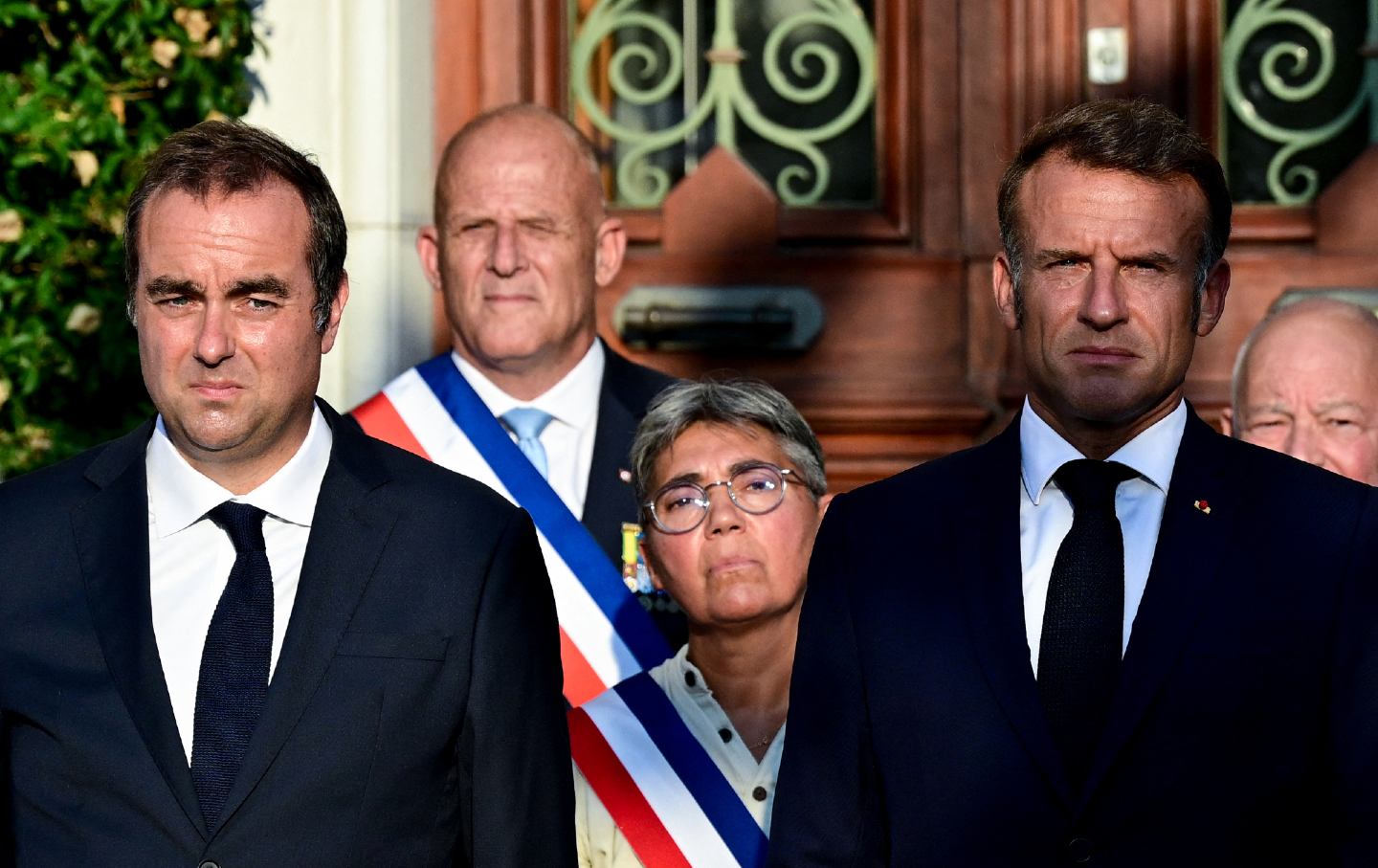
Amid a spiraling political crisis, France’s president is being forced to retreat on his signature reform.
Harrison Stetler

An industry built on addiction and loss now commands enormous political and cultural influence, from NFL stadiums in Philadelphia to soccer stadiums in São Paulo.
Harrison Berger
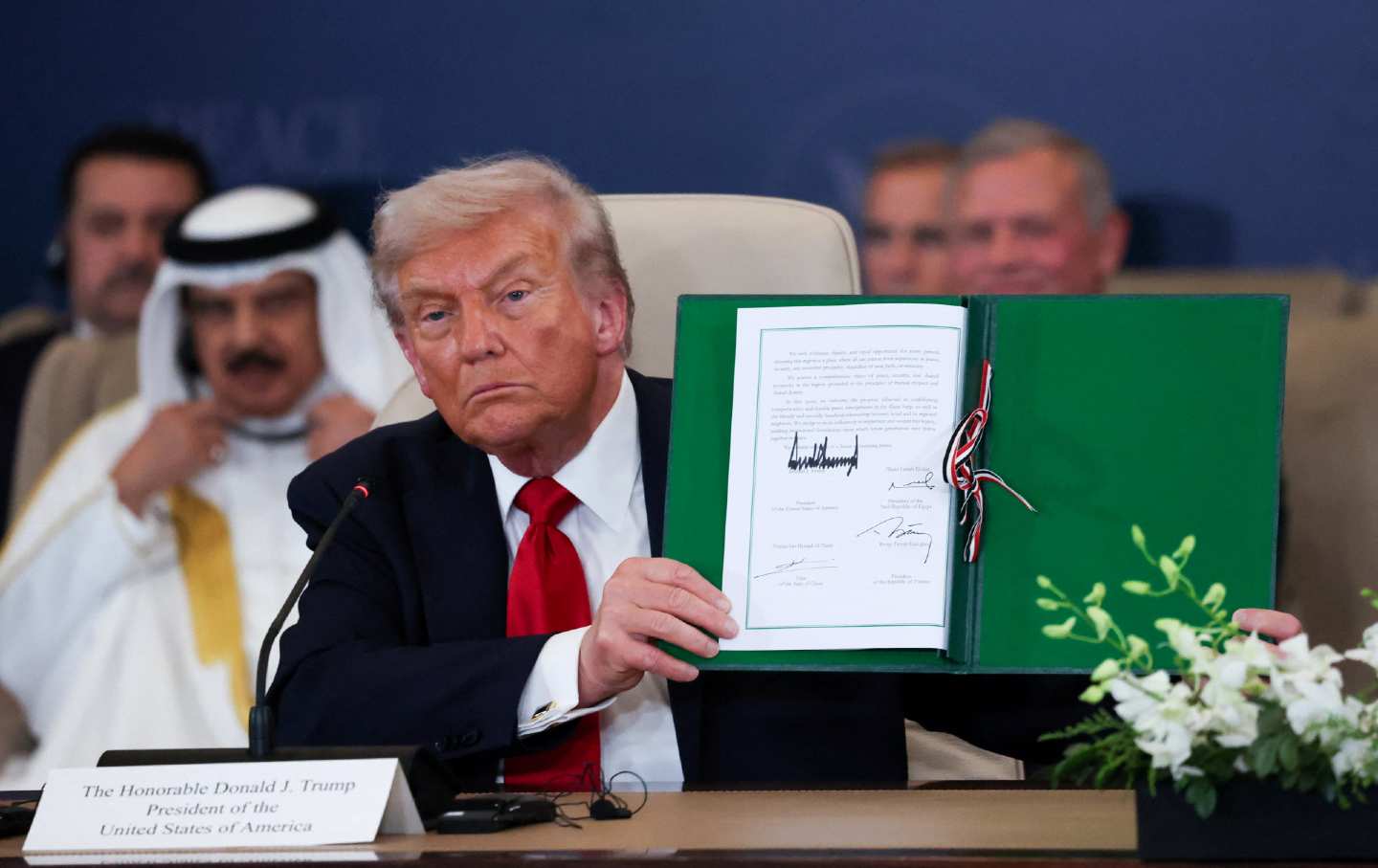
Palestinans are expected to accept the same deal that led to October 7: permanent subjugation under the guise of “prosperity.”
Spencer Ackerman
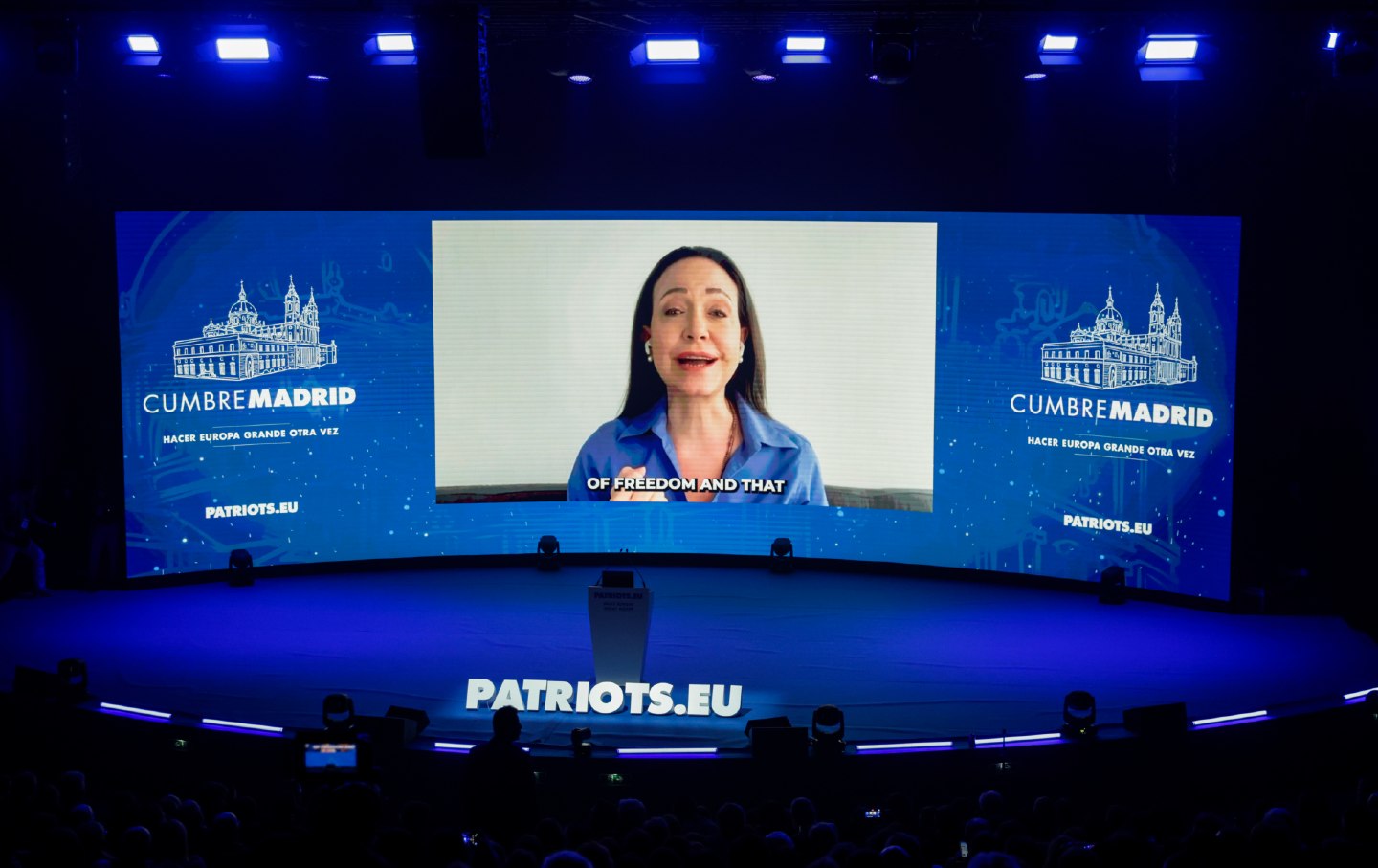
Machado’s record makes a mockery of the idea she is a committed champion of peace, promoter of democracy, or unifying figure.
Gabriel Hetland
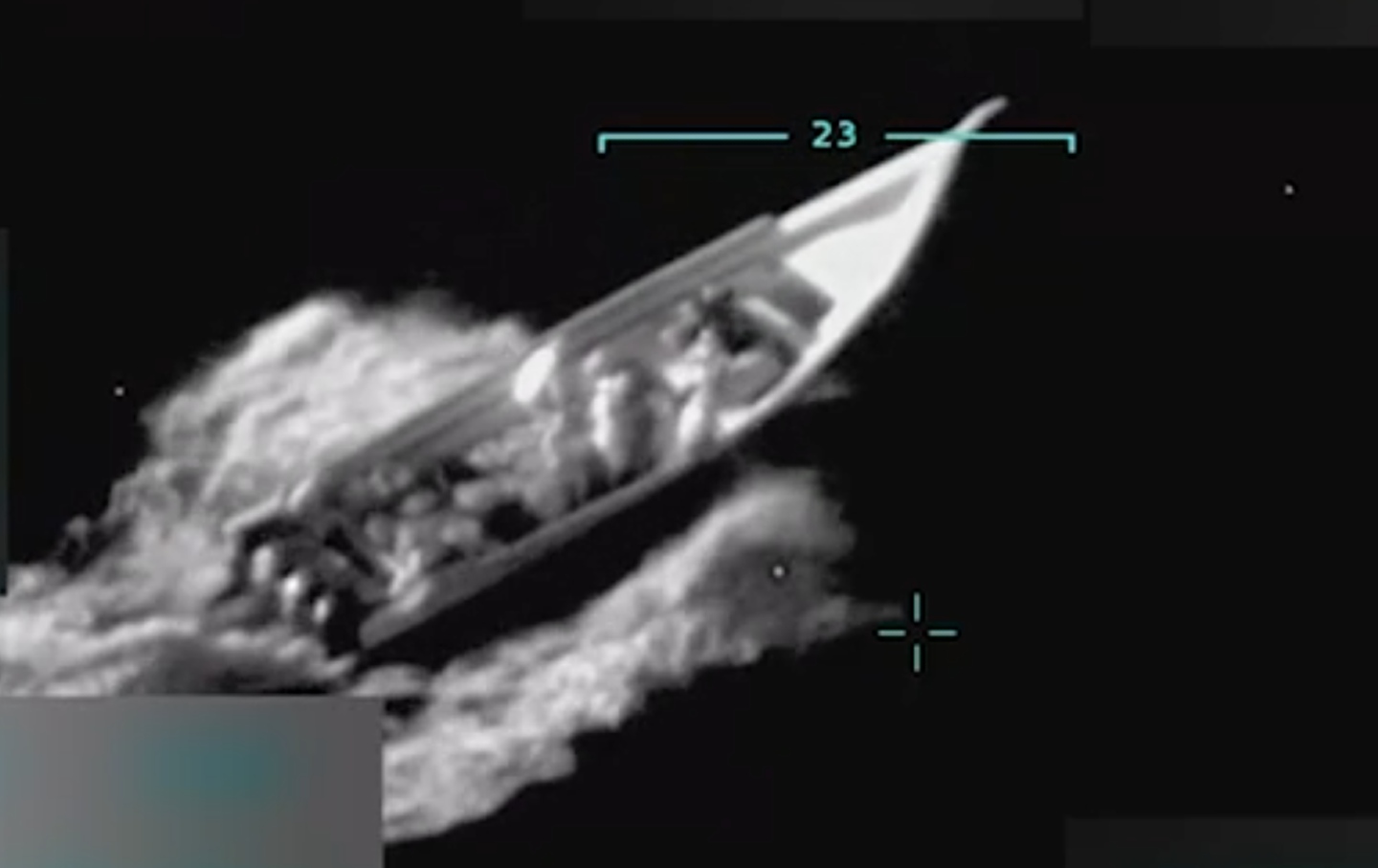
The president’s unprecedented and lawless attacks supposedly target drug cartels, but serve a far more troubling political agenda.
Greg Grandin
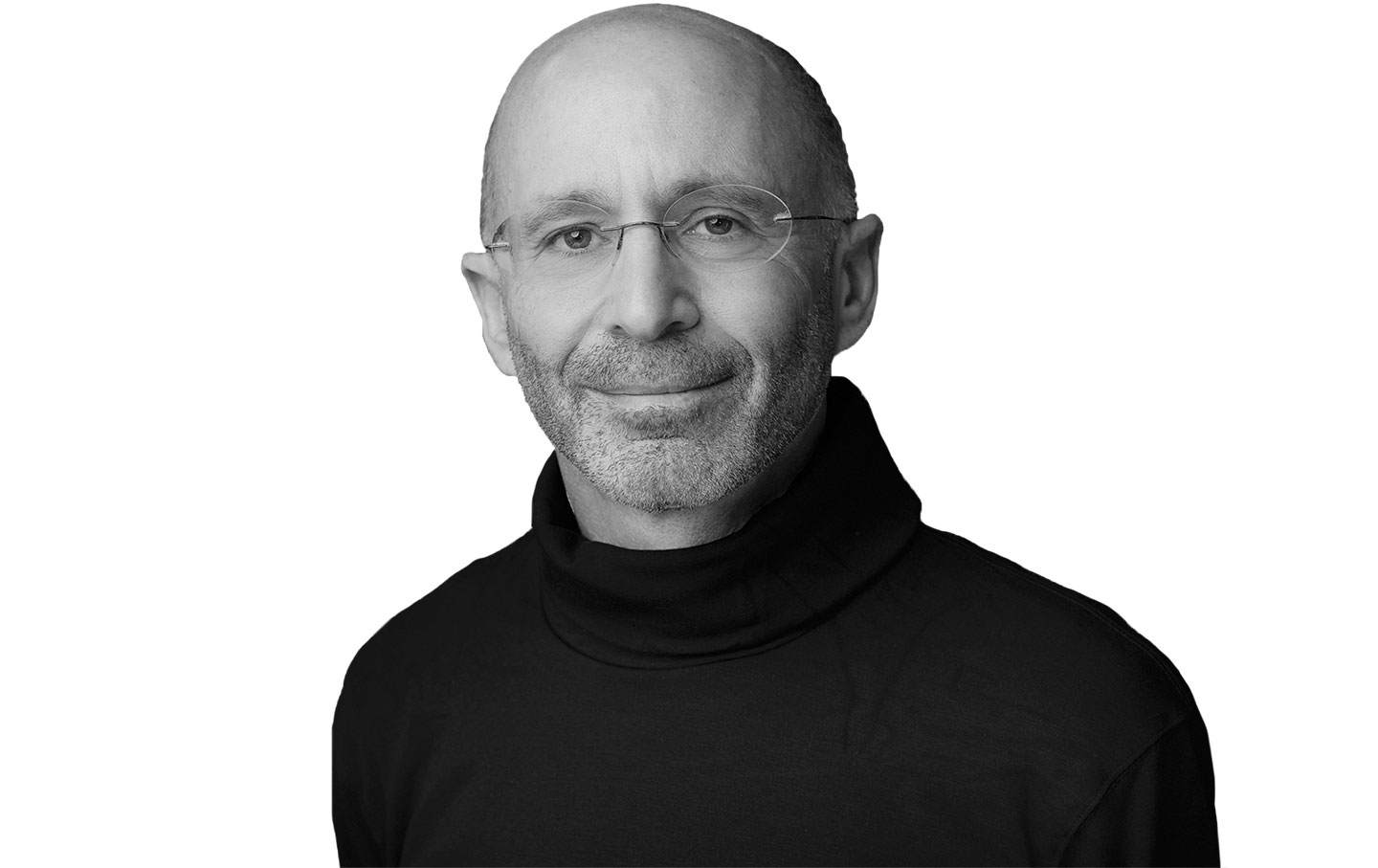
A conversation with Robert Malley about Israel’s actions in Gaza and the West Bank, why the US failed to bring peace to the region, and his recent book Tomorrow Is Yesterday.
Q&A
/
Ahmed Moor


